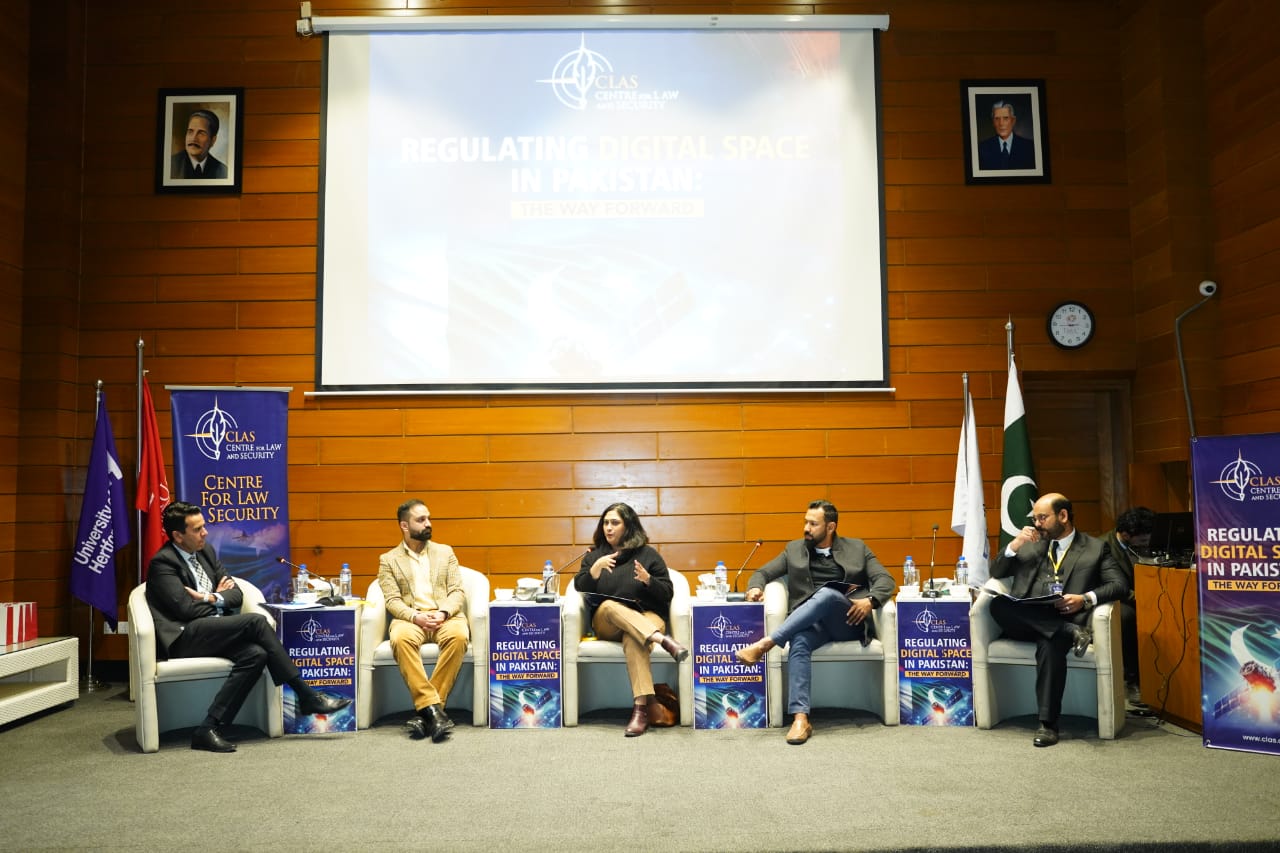
- Discover TMUC
- Notification
- Study at TMUC
- Life at TMUC
- Student Services
- Careers
- Contact Us
The Centre for Law and Security (CLAS) recently hosted a thought-provoking panel discussion titled ‘Regulating Digital Space in Pakistan: The Way Forward’ at The Millennium Universal College (TMUC) in Islamabad. The event brought together experts and practitioners from various fields to deliberate on the urgent need to regulate Pakistan’s digital space in line with both local and global challenges.
The panel discussion, attended by a large number of students, faculty members, and industry professionals, was graced by the Chief Guest, Sardar Masood Khan, the former President of Azad Jammu & Kashmir (AJK). The event aimed to explore how Pakistan can effectively regulate its digital landscape to foster societal progress while addressing emerging challenges in cybercrime, artificial intelligence (AI), and digital rights.
Several prominent figures shared their perspectives on the future of Pakistan’s digital space. Sadaf Khan, Co-founder of Media Matters for Democracy, highlighted the critical importance of digital access and literacy in Pakistan. She emphasized the need for a multi-stakeholder approach to policymaking, addressing the gaps in cybercrime regulation and AI governance. According to Khan, fostering public awareness of the risks and benefits of digital tools is essential for creating a digitally literate society.
Usama Khilji, a renowned digital rights activist and Director of Bolo Bhi, brought attention to the concept of national interest in the digital realm. He advocated for the internet to be recognized as a fundamental right and called for a constitutionally grounded approach to internet regulation. Khilji also highlighted the detrimental impact of internet shutdowns on citizens, especially freelancers, and emphasized the need for safeguarding digital freedoms.
Yawar Siddique, Co-founder of RepStack and RepStack Learning Academy, discussed the economic ramifications of internet disruptions. He pointed out that Pakistan’s digital workforce, particularly freelancers and entrepreneurs, plays a pivotal role in the country’s economy, contributing nearly 60% of the country’s dollar income. Siddique underscored the importance of supporting Pakistan’s digital entrepreneurs and urged against policies that disrupt internet access.
Sheikh Waqas Bin Aamir, Advocate at the Islamabad High Court and Head of the Law Program at TMUC, stressed the importance of societal adaptation to technological advancements. He proposed a phased policy approach to digital regulation, starting with collaboration between think tanks, academia, media, and the tech industry. Aamir emphasized that such cooperation would lead to the formulation of more effective national policy frameworks.
The session was expertly moderated by Rehman Azhar, Director of CLAS, who emphasized that digital space regulation is an essential aspect of modern statecraft. Azhar pointed out that effectively managing digital platforms would be key to ensuring Pakistan’s digital space contributes positively to national prosperity.
In his concluding remarks, Ambassador Masood Khan, President of CLAS, praised the panelists for their insightful contributions. He highlighted Pakistan’s untapped potential in the technology sector, with over 143 million broadband users and more than 60% of the population having access to the internet. Ambassador Khan expressed optimism about the country’s digital future, urging the creation of policies that harness the potential of Pakistan’s youth and align with global technological advancements.
The panel discussion concluded with a shared consensus on the urgency of regulating Pakistan’s digital space. The event underscored the need for inclusive and collaborative efforts between academia, the tech industry, and policymakers to develop frameworks that ensure the digital landscape contributes to a prosperous and connected future for Pakistan. With the global digital economy evolving rapidly, Pakistan’s ability to regulate and harness its digital potential will play a crucial role in shaping the country’s economic and social future.
As Pakistan continues to expand its digital footprint, the dialogue initiated at this event marks an important step in addressing the complex challenges and opportunities in the digital space. The hope is that such discussions will lead to the formulation of robust policies that are not only reactive but proactive in leveraging technology for the country’s growth and global integration.